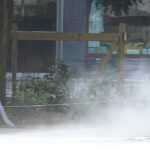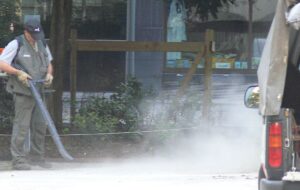
By Marina (Goreau) Atlas and Karen Cady-Pereira
In recent years, Belmont residents have become acutely aware of the roar, fumes, and particulate dust emitted from two-stroke gas-powered leaf blowers. A new town policy will soon change the use of gas-powered leaf blowers that emit cancer-causing particulates, send out winds that can exceed Category 5 hurricanes, and stir up everything from road dust to pollen to particles left behind from Muffin and Fido’s morning walk. This policy is an important step to improve our relationship with lawns and encourage healthy landscapes that enhance our quality of life.
From May 15 to September 30, using gas-powered leaf blowers for commercial uses is banned town-wide. The bylaw, also known as Article 12, was voted on and approved at a special Town Meeting session on November 29, 2022. Created with input and endorsed by residential groups, town officials, environmentalists, and landscapers, the bylaw will enact several changes now and over time to improve both air quality and quality of life in Belmont without causing undue harm to businesses that operate locally.
Gas-oil blowers will be fully sunsetted by 2026, when using gas-powered leaf blowers in Belmont will be illegal. Immediate limits include allowing no more than two units for most properties, including non-commercial users, and no more than four on larger lots (depending on size),. Some people may be wondering how this policy will help residents and workers alike without causing undue burdens.
Gas leaf blowers reduce air quality
Gas-powered leaf blowers contribute to poor air quality and only last a few years. Workers are at the greatest risk of hearing loss and toxic exposure from these tools. As the machines that are currently in use start to die, options like electric tools, which improve yearly and are already used by residents in Belmont on multiple lots, are easy to replace by taking advantage of local incentives.
Town-wide acquisition of gas leaf blowers will also cease moving forward. Alternatives like rakes and no-till flowerbeds are solutions for people wishing to try a different approach to land management and yard upkeep. Electric blowers and rakes open the door to new solutions—and old ones that are good for people, pets, and pollinators. These options will allow businesses to immediately improve the noise and air pollution aspects while minimizing burdens on landscaping service providers and improving working conditions.
Gasoline-oil-fueled two-stroke engines used in leaf blowers are incredibly dirty, emitting a toxic mix of nitrous oxides, carcinogenic hydrocarbons, and ultrafine, ultralight particulate matter.
Gasoline-oil-fueled two-stroke engines used in leaf blowers are incredibly dirty, emitting a toxic mix of nitrous oxides, carcinogenic hydrocarbons, and ultrafine, ultralight particulate matter. One study found that the amount of hydrocarbon air pollutants emitted by running a gas-powered leaf blower for 30 minutes is equivalent to driving a pickup truck at least 1,500 miles from Boston to Jacksonville, Florida, and releasing the exhaust into one location. Furthermore, the hurricane-force wind speeds of all leaf blowers loft allergens and debris like fecal matter and fine particulate matter like brake dust into the air, desertifies soil, and damages the roots of plants.
Under the new bylaw, homeowners are responsible for asking landscapers to switch to other methods. The newest electric leaf blowers are capable of powerful and quieter air movement but without the low-frequency noise that travels far and causes permanent hearing loss and other combustion-related health harms. Electric blowers also do not emit carcinogenic emissions; personal protective equipment is typically inadequate for worker protection.
Gas-oil leaf blowers impoverish the soil
The air forced from blowers destroys the upper structure and habitat of the life that teems in our soils and makes plants thrive. This layer supports bacteria and fungi and housing for beneficial insects, Healthier soil, ecosystems, and food webs require less intervention in your garden, thus making your yard more sustainable. Easing “mowing and blowing” and encouraging the building up of new, undisturbed organic matter layers on soil surfaces improves ecological health. It can be a boon to human health too.
Two-stroke engines harm health
The two-stroke engines used by gas-powered leaf blowers emit noise pollution at magnitudes of up to 115 decibels, surpassing even rock concerts and chainsaws. You may have experienced this shroud of low-frequency noise while walking past a working crew or if using a gas-powered leaf blower yourself with no ear protection, or several houses or even blocks away without sufficient shrubbery to dampen the roar. These tools can cause permanent hearing loss for anyone nearby after even short-term uses.
For reference, the National Institute for Occupational Safety and Health lists noise at 85 decibels or above as hazardous to human health. Subsequent noise pollution is associated with both hearing loss and multiple stress-related illnesses in humans and wildlife alike. Health experts’ articles in multiple medical journals provide strong evidence that high levels of noise, such as from two-stroke blowers, not only damage hearing but also lower cognitive function and impacts systemic health across age groups (memory, attention, performance, motivation, heart, lung, blood, and brain) from the mental to the physical.
A switch to old-school raking can provide even more benefits like physical activity, peaceful quiet, and zero emissions, including eliminating those that damage the heart, lungs, brain, and circulatory systems. You can also try newer methods of land stewardship. Each step from “lawn to life” can improve garden health and make landscaping service work more interesting and free of the dust and noise that harms health while on the job.
Try sheet mulching with no-dig and no-till methods or more modern soil remineralization amendments which can be combined with these methods. These choices can increase soil-based carbon sequestration through biogeochemical remineralization and filter out pollutants from stormwater runoff in a new or expanded garden bed.
A small change in your gardening practices or your landscaping services can improve and build soil, highlighting existing open space. You can use your lot as a new location to store leaves (or tuck in layers of uncolored cardboard, leaf mold, and compost) and allow the breakdown products to build and feed the soil, reduce plant stress, create space for native plants, provide songbird health food, and support biodiversity that greatly bolsters our health. Other benefits of these techniques range from improved mental health from greater access to nature to improved air quality through eliminating toxic, two-stroke leaf-blower emissions, which can improve health and quality of life and increase property value.
Everyone has a right to a healthy environment
This right includes freedom from undue hazards where you live, work, and play.
Residents and landscape service providers who have experienced two-stroke blower emissions exposure and residents impacted by nearby noise, fumes, and dust will get a break from these annoyances this summer. You may soon see your neighbors talking with landscaping companies about how to take advantage of Belmont Light’s rebates for the newest and most advanced electric leaf blowers without trying to talk over several leaf blowers.
You might also see residents pulling out their rakes and enjoying speaking with neighbors, making new friends, and spending time outside in their yards. Until recently, people who live or work in Belmont, particularly people like those who spend time outside, had to put up with leaf blower noise and pollution. Everyone will soon have more opportunities to breathe fresh air and enjoy peace and quiet each time they open their windows.
The bylaw will apply to everyone beyond just commercial operations in 2026. That gives homeowners and residents plenty of time to try extending a garden bed, adding more native plants to the landscape, and putting in requests with your favorite landscape service provider to boost your curb appeal, mood, and health. For reference, the town will maintain a list of landscaping companies that have agreed to adhere to the policies enacted by the bylaw.
This new policy is supported by incentives for landscapers who operate in Belmont. So if you still hear the din, roars, and hums of a leaf blower fleet making the rounds, please consider taking the opportunity to talk with your neighbor about the bylaw that improves air quality for residents and safety for landscape service providers at work.
Thank you to the Select Board members, Town Meeting members, and environmentalists, and landscaping companies for your support of this bylaw to help make Belmont cleaner, quieter, and healthier. Special thanks to Ian Todreas, Jean Devine, and members of the Healthy Lawns group at Sustainable Belmont.
Further information
You can read more at: www.belmont-ma.gov/department-of-public-works-dpw/pages/leaf-blower-bylaw-information.
The full text of the town bylaw can be found at
www.belmont-ma.gov/department-of-public-works-dpw/pages/leaf-blower-bylaw-information.
Marina (Goreau) Atlas is an advocate for ecosystem regeneration and environmental health, a native plant gardening enthusiast with a background in environmental health and toxics, and a Belmont resident.
Karen Cady-Pereira is a long-time Belmont resident who works in remote sensing of the atmosphere. She would like to be able to enjoy walking around the town without the noise and pollution created by gas-powered leaf blowers.




Sorry, the comment form is closed at this time.